|
Matters Arising
It was never my intention to make ‘Matters Arising’ a regular feature of this august column, but when the reading public demands to be heard (and one can get a cheap laugh out of it), then they should be heard.
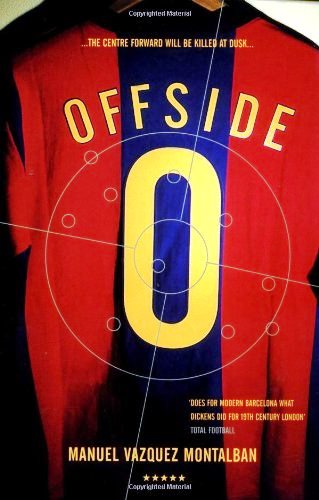
In last month’s sermon I addressed that thin seam of football-based thrillers currently being mined by Philip Kerr and have received an angry missive, signed simply “Outraged of Villa Park” pointing out - with some justification - that I had failed to mention the late Manuel Vazquez Montalban’s famous novel Offside, first published in Spanish in 1989 but not, I think, translated into English until this century. I realise that my ignorance of modern European languages is no excuse but would stress that my admiration for Montalban (a gastronome and die-hard Barcelona supporter) and his fictional hero Pepe Carvalho is second to none and no sleight to him was intended. As to supporters of Aston Villa (and you know who you are), I refrain from comment other than to recommend the weekly BBC television programme Match of the Day, where Aston Villa games often take the top-of-the-bill spot by appearing last.
*
My use of the phrase “to our muttons” prompted regular reader Terry Morris to write to me to point out its origin was in the 15th Century French (and not Welsh, as many thought) quotation Revenons à nos moutons - ‘Let’s get back to the sheep’ - which, of course, I knew. What I did not know was that the phrase was used by Ngaio Marsh in her 1974 crime novel Black As He’s Painted. I, of course, came across the phrase much earlier when it was utilised to such great effect by that literary giant Peter Cheney in his Dark Bahama in 1950.
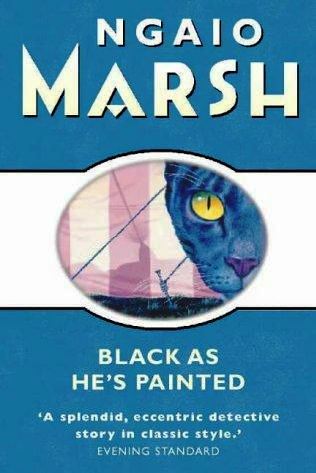 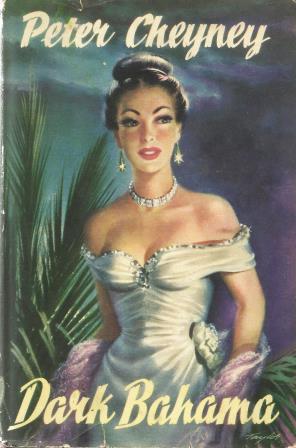
*
No sooner had I mentioned that there was a new Leonardo Padura novel coming out, I learned that the Cuban maestro’s famous ‘Havana’ quartet were to be dramatized on BBC Radio 4. And very good they were too. Three have already been aired but the last in the quartet, Havana Black, will be broadcast on 6th December.
.JPG)
I am sure, however, that thanks to modern technology and the BBC iPlayer, there will be a way to “catch up” for those who missed them.
*
London Particular
The Autumn Lunch of the Margery Allingham Society always signals the start of the Festive Season with good victuals and excellent company and this year’s event was no exception. Held in Porters English Restaurant in Covent Garden (for the last time, as the restaurant is to close to make way for a much-needed ‘retail outlet’), the most popular choice of starter was the restaurant’s famous London Particular – a thick ham and pea soup – a dish which, if it did not, certainly should have featured in an Allingham book.
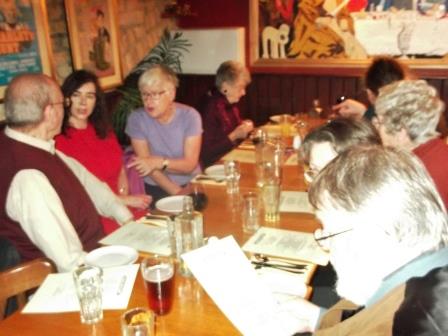
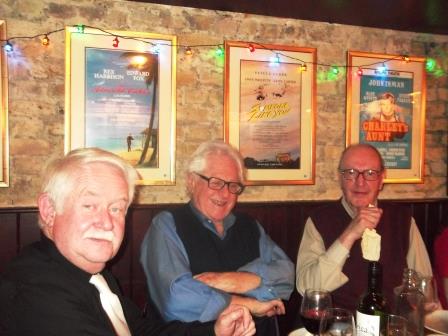
For me, the lunch provided an opportunity to discuss a novel I had not heard of until I was told about it by Society chairman Barry Pike – a novel not in the Allingham canon, but one clearly inspired by Margery’s fiction and featuring one of her characters.
London Bridges by Jane Stevenson was published in 2000 by Vintage and I am afraid to say passed me by completely. Not only is it dedicated to the memory of Margery Allingham but it features the adult Hattie Luke, daughter of Detective Superintendent Charlie Luke (Margery’s favourite fictional policeman) and last mentioned as a child in The China Governess in 1963.

In Jane Stevenson’s atmospheric and rather beguiling London Bridges, Hattie is a London veteran, having taken the city, its quirks and hidden geography to her heart, who frequents forgotten squares, alleys and seedy cafes with an adopted lurcher. She becomes involved in a mystery involving lost treasure buried in the vaults of a City bank, Greek monks and the manuscript of an ancient homoerotic poem. There is also a method of murder (or at least doing the victim serious damage) which comes direct from the ‘Golden Age’ of English crime writing.
Part homage to Allingham, part love letter to the bits of London nobody notices these days, as it would involve raising their eyes from an electronic screen, London Bridges is a rich, clever novel which I am glad to have discovered – finally.
Still on the subject of London, I must take advantage of my senior citizens’ travel card to book a ticket on the mail coach so that I can visit the Museum of London before April to view the new Sherlock Holmes exhibition the Man Who Never Lived and Who Will Never Die.

I hear nothing but good things about this exhibition, which runs until the 12th April 2015, full details of which can be found at: www.museumoflondon.org.uk
Party Spirit
The real sign that Christmas is fast approaching is of course the Publishers Publicity Circle party, an utterly splendid event held this year in Foyles’ palatial bookshop in the heart of London bookland on the Charing Cross Road.

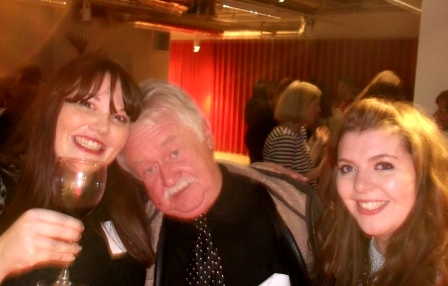
As usual the company was charming and the refreshments generous. I have always found this particular party especially rewarding as it makes the humble reviewer feel honoured, respected, flattered and incredibly old.
Guns, Streets and Girls
When I learned that Serpent’s Tail were to publish a new novel by Adrian McKinty in January a bell began to ring somewhere at the back of my dusty, cobweb-strewn brain. Was it the fact that McKinty (who now lives in Australia) was this year’s winner of the Ned Kelly Award for fiction with his novel In the Morning I’ll Be Gone? No, I knew that well enough. Was it the Belfast in 1985 setting which struck a chord? Not particularly: it is clearly an excellent setting for a thriller involving McKinty’s hero Detective Inspector Sean Duffy - a rogue Catholic cop in the heavily Protestant Royal Ulster Constabulary.
And then it came to me - the title. I had heard that title before, and not just the 1985 Tom Waits song from which (I’m guessing) it was taken, or rather, they were taken.
 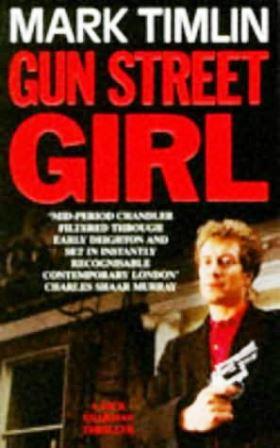
Gun Street Girl (McKinty, 2015) is the fourth outing for his hero Sean Duffy, whereas Gun Street Girl (Mark Timlin, 1990) was the third outing for South London ex-cop-turned-private-eye Nick Sharman, who was briefly immortalised in a short-lived television series in 1996 by the then little-known actor Clive Owen.
Just to confuse matters even more, Mark Timlin’s Gun Street Girl (should we call that one ‘Mark 1’?) has, I hear, been recently reissued by No Exit Press.
Unspoiler Alert
I was still awaiting delivery of my new bifocals when I received a copy of The Moonlit Door by Deryn Lake, a boulevardière after my own heart, which I naturally rushed to devour. I mention this as my excuse for total misreading the jacket blurb, which at first glance seemed to be tempting me with a plot involving the murder of an entire troop of Morris Men. For one brief blissful moment, I thought this had the makings of the ideal plot as - be honest - who among us have not imagined such a scenario?
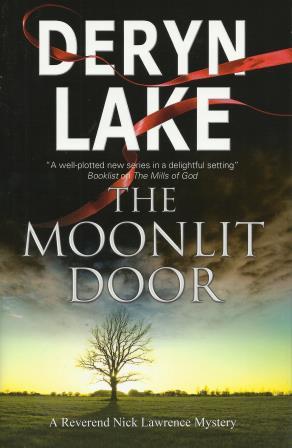
I admit that I read carelessly and in haste and my imagination took over as soon as I registered the words ‘Morris Dancers’, for a gang of those dedicated funsters does indeed appear in The Moonlit Door (Severn House), performing at a May Day ceremony in the sleepy Sussex village of Lakehurst where – as fans will know – the vicar is the Rev. Nick Lawrence, a dab-hand at murder mysteries as well jumble sales, keeping the Women’s Institute in check and evensong.
Interestingly, the dance troop (not a good word as it suggests some semblance of military precision) in the book is called Mr Grimm’s Men and I learn that ‘Mr Grimm’ is old Sussex slang for The Devil.
To my personal disappointment Mr Grimm’s Men are not killed en masse in a devastating explosion, but a much more tragic death does take place during the dancing around the maypole. Beyond that, the Code of Plot Spoilers (they’re Guidelines really) prevents me from saying any more.
He’s Checking It Twice
Given the plethora of crime-writing awards that exist nowadays (at least 29 were dished out in November alone) I have decided, as an experiment, not to clutter the scene further with Shots of the Year awards - which for some reason was regularly mis-spelled anyway. Instead I have humbly submitted a list of my favourite crime novels of 2014 to Santa Claus so that he may use it as a template - Santa’s Shots Selection - from which he can fill the Christmas Lists of many readers after, naturally, he has checked whether they have been naughty or nice.

[Technical Note: The Santa pictured above is, of course, not the real one but rather my old friend and mentor, the late John Young, Chairman of Young’s Brewery of Wandsworth who, in the good old days, always modelled for the company Christmas card.]
And so, in no particular order, here are the 2014 Santa’s Shots Selection:
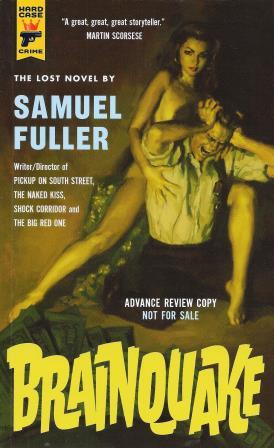 Brainquake by Samuel Fuller [Hard Case Crime]. Hardboiled, violent, frenetic, in fact a bit bonkers, but a highly addictive swansong from the renegade writer and film director. First time published in English. Brainquake by Samuel Fuller [Hard Case Crime]. Hardboiled, violent, frenetic, in fact a bit bonkers, but a highly addictive swansong from the renegade writer and film director. First time published in English.
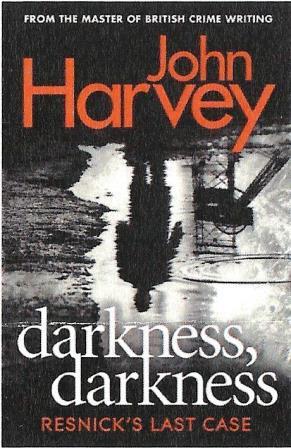 Darkness, Darkness by John Harvey [Heinemann]. Sadly the last outing for Charlie Resnick, one of the finest fictional coppers from the last fifty years of British crime writing and a thoughtful reflection on the aftermath of the miners’ strike in the Nottinghamshire coalfields. Darkness, Darkness by John Harvey [Heinemann]. Sadly the last outing for Charlie Resnick, one of the finest fictional coppers from the last fifty years of British crime writing and a thoughtful reflection on the aftermath of the miners’ strike in the Nottinghamshire coalfields.
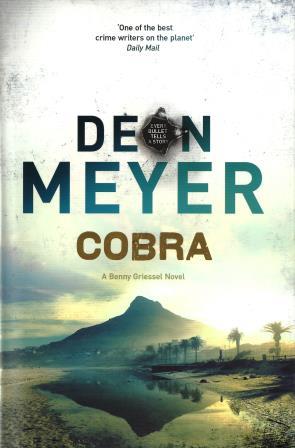 Cobra by Deon Meyer [Hodder]. An excellent South African thriller featuring one of the best ensemble casts of policemen currently pounding the crime beat. Makes most Scandinavian crime fiction taste of freezer burn. Cobra by Deon Meyer [Hodder]. An excellent South African thriller featuring one of the best ensemble casts of policemen currently pounding the crime beat. Makes most Scandinavian crime fiction taste of freezer burn.
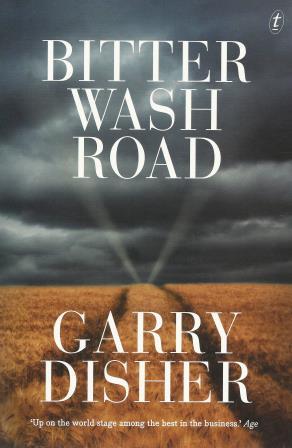 Bitter Wash Road by Gary Disher [Text Publishing]. Very impressive, very suspenseful Australian chiller about a lone honest cop fighting villains and corrupt colleagues in a dusty and desolate back-of-beyond. Bitter Wash Road by Gary Disher [Text Publishing]. Very impressive, very suspenseful Australian chiller about a lone honest cop fighting villains and corrupt colleagues in a dusty and desolate back-of-beyond.
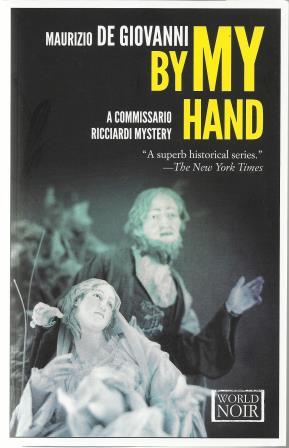 By My Hand by Maurizio De Giovanni [Europa/World Noir]. Set in Fascist-era Naples with a detective who ‘sees dead people’. Surprisingly tender in places, sometimes slightly mystical but always intriguing and very well translated. By My Hand by Maurizio De Giovanni [Europa/World Noir]. Set in Fascist-era Naples with a detective who ‘sees dead people’. Surprisingly tender in places, sometimes slightly mystical but always intriguing and very well translated.
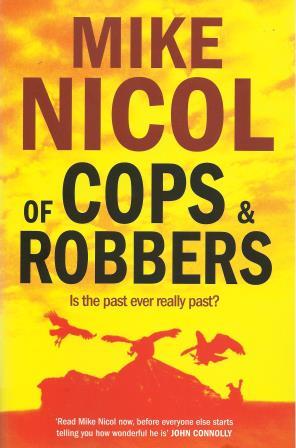 Of Cops and Robbers by Mike Nicol [Old Street]. More South African mayhem, this time featuring a surfer-dude private eye and his ultra-cool poker-playing girlfriend having to confront the country’s violent political past. Of Cops and Robbers by Mike Nicol [Old Street]. More South African mayhem, this time featuring a surfer-dude private eye and his ultra-cool poker-playing girlfriend having to confront the country’s violent political past.
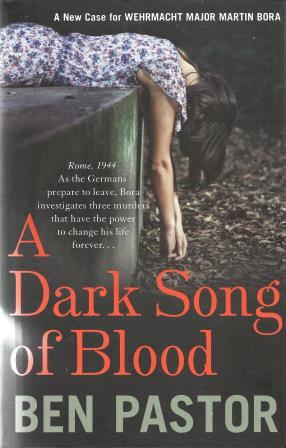 A Dark Song of Blood by Ben Pastor [Bitter Lemon]. The third (in the UK) mystery for Martin von Bora, the aristocratic, humane Werhmacht officer stationed in Italy in 1944. This is a series which has taken far too long to get to England but the good news is that another is on the way. A Dark Song of Blood by Ben Pastor [Bitter Lemon]. The third (in the UK) mystery for Martin von Bora, the aristocratic, humane Werhmacht officer stationed in Italy in 1944. This is a series which has taken far too long to get to England but the good news is that another is on the way.
 The Suicide Club by Andrew Williams [Hodder]. Superior spy fiction set in WWI set behind both sets of lines - enemy and allied. Well researched, wonderfully written. The Suicide Club by Andrew Williams [Hodder]. Superior spy fiction set in WWI set behind both sets of lines - enemy and allied. Well researched, wonderfully written.
 The Silent Boy by Andrew Taylor [Harper]. Richly textured historical mystery against a backdrop of the French Revolution. Engaging, insightful and remarkably readable with some delicious hints at how the British establishment took to espionage as a natural adjunct to diplomacy. The Silent Boy by Andrew Taylor [Harper]. Richly textured historical mystery against a backdrop of the French Revolution. Engaging, insightful and remarkably readable with some delicious hints at how the British establishment took to espionage as a natural adjunct to diplomacy.
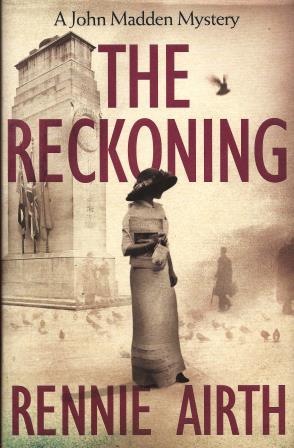 The Reckoning by Rennie Airth [Mantle]. The long-awaited return of Inspector John Madden, whose short (far too short) fictional career spans both World Wars and here, both wars hold clues to a series of execution-style murders in 1950s Britain. The Reckoning by Rennie Airth [Mantle]. The long-awaited return of Inspector John Madden, whose short (far too short) fictional career spans both World Wars and here, both wars hold clues to a series of execution-style murders in 1950s Britain.
Yellow is the new Noir
On a damp and misty London night last month, the Christmas lights blinking through the traffic fumes and the thronging crowds, The Italian Cultural Institute on Belgrave Square offered a haven of light, warmth and intelligent debate about “Giallo” or “Yellow” – the traditional publishing colour for Italian crime fiction and now synonymous with the genre, just as ‘Serie Noir’ became in France and ‘Penguin Green’ or ‘Gollancz Yellow Jacket’ did in Britain.

[Left to right: The Ripster, De Giovanni, Sisterson and Tura]
Leading the discussion were Italian crime writers Maurizio De Giovanni (about whom I will be writing later in another place) and Stefano Tura (a London-based journalist for RAI Television) as well as a New Zealander fresh from the Iceland Noir convention in Reykjavik, journalist, critic and founder of the influential Crime Watch blog, the globe-trotting Craig Sisterson.
|
|
Digging Deep
Most of this column’s regular readers will instantly associate the name Glyn Daniel with his famous 1962 work The Idea of Prehistory, which showed why Dr Daniel was a very worthy professor of archaeology at St John’s College, Cambridge.
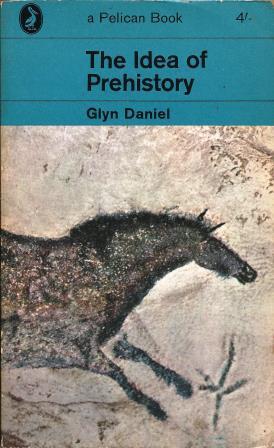
An expert on Palaeolithic sites in France, Glyn Daniel (1914-1986) also wrote crime fiction – sometimes published under his Welsh pen-name of Dilwyn Rees – most notably The Cambridge Murders (1945) and Welcome Death (1954), both of which feature archaeology don Sir Richard Cherrington as the detective.

I highly recommend both books, which have just been brought back into print by Ostara Publishing, to all lovers of traditional English detective stories, whereas lovers of adventure thrillers with a background of underwater archaeology are already devouring the new novel by David Gibbins, Pyramid, out now from Headline.
David Gibbins did his PhD in archaeology at Cambridge and really is an expert diver, like his hero Jack Howard (Pyramid is his eighth Jack Howard thriller). As my standard reference work on underwater archaeology – by Philippe Diolé, who worked with Jacques Cousteau – is now sixty years old, I really should read more David Gibbins to discover what advances have been made in the field.
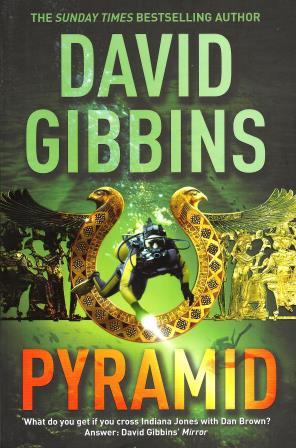 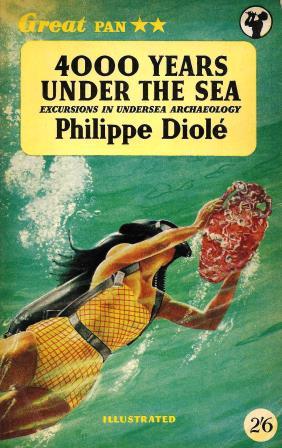
The Mamur Zapt and the Legendary Editor
More than 25 years ago, back in the last century, when I was a fresh-faced, fledgling crime writer I always took notice of what my editor said; especially if that editor was the legendary Elizabeth Walter of Collins Crime Club.
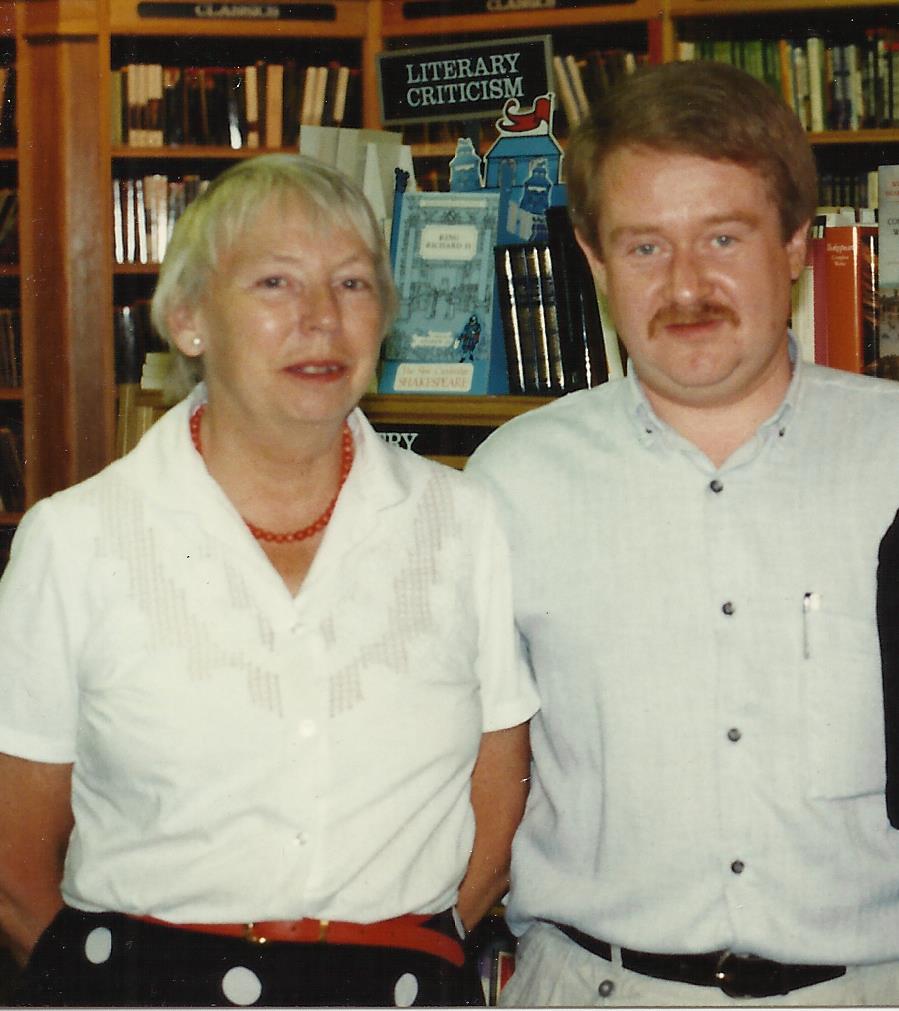
As she had bought my first ‘Angel’ novel and asked for a second, I was, naturally, hanging on Elizabeth’s every word, especially when she recommended writers I should read. I quickly realised this was something of a test for her new authors and one I like to think I scored highly in as I was able to assure her that I had already read - and enjoyed - the work of Robert Barnard, Reginald Hill and Liza Cody. However, two names on Elizabeth’s “you really ought to try” list (which was more an instruction than a suggestion) were new to me. One was American Walter Satterthwait, who was to become a good friend and who is now my Vicar on Earth in the Florida Keys.
The other was a charming man called Michael Pearce, another of Elizabeth’s recent acquisitions or ‘babes’ (as in small child, not…) who wrote novels set in pre-1914 Egypt and had a hero called ‘The Mamur Zapt’, which meant absolutely nothing to me, so I had to find out.
I discovered that Mamur Zapt was in fact a job title; the head of the Khedive’s secret service - the Khedive being the Viceroy of Egypt under the Ottoman Empire, even though Egypt at this time was run by the British. Hence the holder of that title was a British officer, a certain Captain Gareth Owen.
Michael Pearce’s Mamur Zapt mysteries always offered a good mystery and a fascinating setting with tons of local colour (Pearce grew up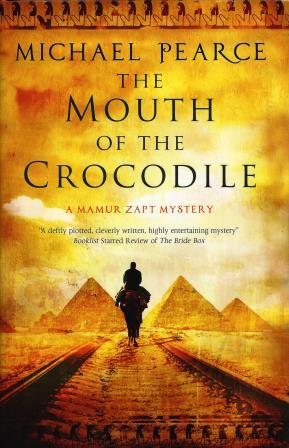 in Anglo-Egyptian Sudan), but always avoided the rose-tinted Egyptologist view (so brilliantly done by Elizabeth Peters) and concentrated on the Byzantine politics of the situation, with more of a nod towards Eric Ambler than to King Tut. in Anglo-Egyptian Sudan), but always avoided the rose-tinted Egyptologist view (so brilliantly done by Elizabeth Peters) and concentrated on the Byzantine politics of the situation, with more of a nod towards Eric Ambler than to King Tut.
I am delighted to see that the series is still going and the eighteenth adventure of the Mamur Zapt, The Mouth of the Crocodile, has just been published by Severn House.
The Killer Elite
The Detection Club has always been regarded as the elite front-line unit of British crime writing (I myself never ventured further than the Catering Corps) and seem to have been busier than ever this year, producing new editions of the anthologies they have been famous for from the 1930s up to 2005, which is when The Detection Collection was first published.

The new edition, edited by Simon Brett and published by HarperCollins, contains eleven stories from famous names such as Lindsey Davis, Colin Dexter, Robert Goddard and John Harvey, along with notable contributions from Robert Barnard, Reginald Hill, Margaret Yorke, Harry Keating and (most recently) P.D. James, who are sadly no longer with us.
Wild West Country
About two years ago I attended a luncheon for crime writer Graham Hurley who had recently moved even further into the far west and was extolling the virtues of living in Devon and comprehensively failing to convert me to the sport of quad coastal rowing, which sounded possibly dangerous and definitely wet and cold.
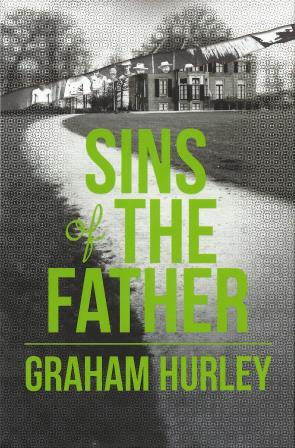
The occasion was the launch of Graham’s new series, set in the West Country, featuring his police detective Jimmy Suttle, whose third outing in Sins of the Father has just appeared from Orion. This was, of course, after Graham had brought his well-known ‘Pompey’ series of police procedurals featuring the cop duo Faraday and Winter and set in Portsmouth, to a close after a dozen titles.
What I did not realise at the time (or I would have asked him about it) was that his ‘Pompey’ series was being filmed for French television under the title Deux Flics sur les Docks, which I believe has been a great success.

Being a French production, it naturally made few concessions to the English setting of the original books – Portsmouth. I understand, however, that the substitution of the seamy docklands of Le Harve for location filming has served so well that only life members of the Pompey Supporters Club can tell the difference.
File on an Iconic Agent
In the wake of the publication of the Ostara Original anthology Callan Uncovered, I hear from one of the authors of the forthcoming The Callan File – the definitive guide to the iconic spy franchise.
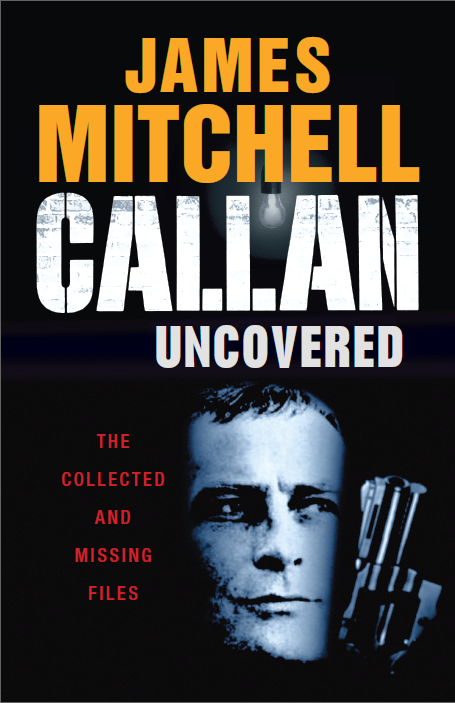 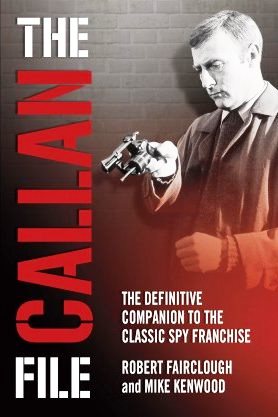
In his detailed researches, Callan-fan Rob Fairclough has unearthed, from 4th March 1973, the original ‘teaser’ advertisement for the Callan short stories which first appeared in the Sunday Express and which are now collected in Callan Uncovered.
CALLAN BLASTS IN…
Three years ago a cold, hard, enigmatic character in a rumpled raincoat made his first appearance [sic] on Britain’s television screens.
He was a special agent. He could if necessary be a killer.
He had no pretty girls to decorate his activities.
He did not go on his assignments in fast, expensive cars.
He had no gimmicks. But he had authority and credibility.
He quickly shot up in the viewing charts – and stayed there.
His name is Callan.
Now the cynical, lonely Callan, brilliantly acted on television by Edward Woodward, is to appear in a new medium.
His creator, author James Mitchell, has written a series of Callan adventures for the Sunday Express.
Like the Callan stories which have gripped television viewers, they are packed with action and suspense – and have an unexpected twist at the end.
The Sunday Express Callan series is a must for all Callan’s TV viewers.
It is a must for all who enjoy a tensely, tersely told story of suspense and mystery.
Watch for Callan next week in the Sunday Express.
And though I thought I would never say this of the Sunday Express, I couldn’t have put it better myself, although as the editor of Callan Uncovered, I am relieved that we were not tempted to sub-title it “the complete short stories” and since publication in November, I have been informed by a Callan fan of no less than nine earlier stories which ran in the Express in 1971-72.
Friends in the (Old) North
I mentioned last month how much I had enjoyed Max Adams’ The King in the North, his historical/archaeological study of Bernicia (what we now call Northumbria) in the Dark Ages (now known as the Early Medieval Period). It proved to be a timely brush-up of my historical knowledge and provided, fortuitously, an incentive to read about contemporary Northumberland as portrayed by Mari Hannah in her new novel Killing for Keeps.
 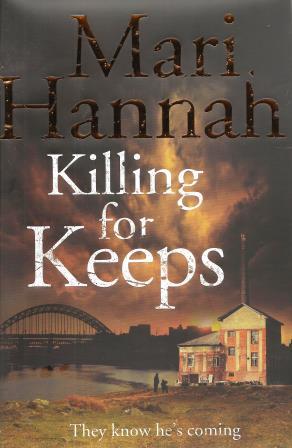
I hasten to say that it is not in the slightest way necessary to be familiar with the history of Oswald Whiteblade and the ancient kingdom of Bernicia to enjoy Mari’s new book which features her very modern policewoman detective, DCI Kate Daniels; not even when the action switches briefly to the old kingdoms of Strathclyde and Dal Riata, or Scotland as I believe it is known today.
Forthcoming Treats for 2015
I am particularly looking forward to my dear chumette Minette Walters’ take on modern-day slavery, a topic which could not be more topical given the latest shocking report from the Home Office, in The Cellar, to be published in May 2015 by Hammer Horror. Before then, in April, anyone who missed it a few years ago will be able to catch up with another piece of her shorter fiction, Chickenfeed, originally written as part of the Quick Reads project to help and encourage the reluctant reader, which has been selected as one of the titles to be given away by volunteers to celebrate World Book Night.
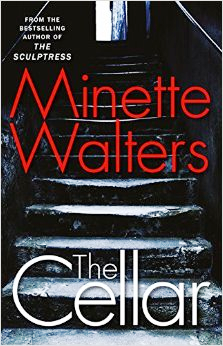 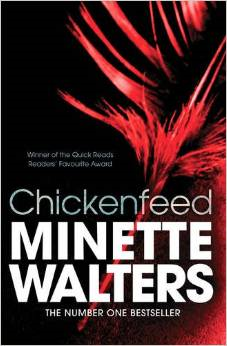
Also in April/May next year I will be treated to new novels from two more of my favourite authors, both published by the ever-impressive Bitter Lemon Press who have been harvesting good crime fiction from foreign fields for ten years now.
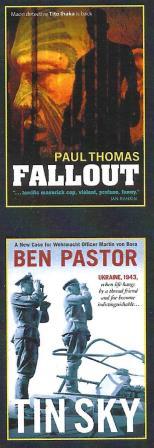
From New Zealand comes Fallout by Paul Thomas and featuring maverick Maori cop Tito Ihaka. Thomas, in my not-so-humble-opinion, is the undisputed Godfather of crime fiction down under in Middle Earth and his detective hero Ihaka is one of the most outstanding creations in crime fiction anywhere in the last twenty-five years. And from Italy, and not before time, comes Tin Sky by Ben Pastor, one of her superb wartime series featuring the aristocratic Wehrmacht officer Martin von Bora. The von Bora books have, for some unknown reason, been rather reluctant to appear in the UK (although written in English) and are only now being recognised for the class act they are.
More immediately in the New Year there will be a new Christopher Brookmyre novel, although he seems to be known as ‘Chris’ these days, featuring his dissolute journalist hero Jack Parlabane. In Dead Girl Walking (from Little, Brown in January) Jack Parlabane is still called ‘Jack’ but we are promised a darker, more serious Parlabane than the rather raucous one which burst on to the crime fiction scene in Quite Ugly One Morning, which won the Critics’ Choice First Blood award back in 1996. I was one of the critics (then for the Daily Telegraph) involved in making that award – when the Crime Writers Association, in their wisdom, had decided there were no worthy first novels that year – and was subsequently quoted on cover blurbs saying “Brookmyre on full auto-rant is a joy” which is a sentiment I still hold to.
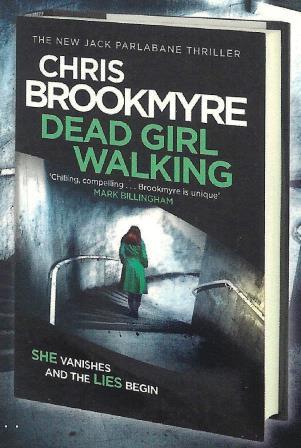 
In February, Doubleday will publish the much anticipated second novel by S.J. Watson, Second Life, following the huge success of Before I Go To Sleep, which did win the CWA’s award for best debut novel.
Revival Corner
Almost by accident (a happy accident) I discovered that the hard-boiled thrillers of American Tom Kakonis are now being published by Brash Books (http://mysterythrillerbooks.com/). I remember being highly impressed with two of his books, Michigan Roll and Double Down, which were published in the UK around 1990 but which, for some bizarre reason, failed to be appreciated.

Not only are Brash Books doing a splendid job reissuing Tom Kakonis’ back list, but also new novels such as Treasure Coast and, in 2015, Flawless. Anyone mourning the loss of Elmore Leonard should certainly seek out Kakonis.
New Year’s Resolution
I do hope that publishers and jacket designers will, in 2015, forswear the use of the ‘lone girl/woman’ running or walking away from the camera as a cover image, for surely it has been done to death this year. I first noticed this worrying trend back in July and since then the situation has deteriorated, the following ten examples being simply the tip of the iceberg in recent weeks.

Enough, already.
Merry Crimbles to One and All,
The Ripster.
|